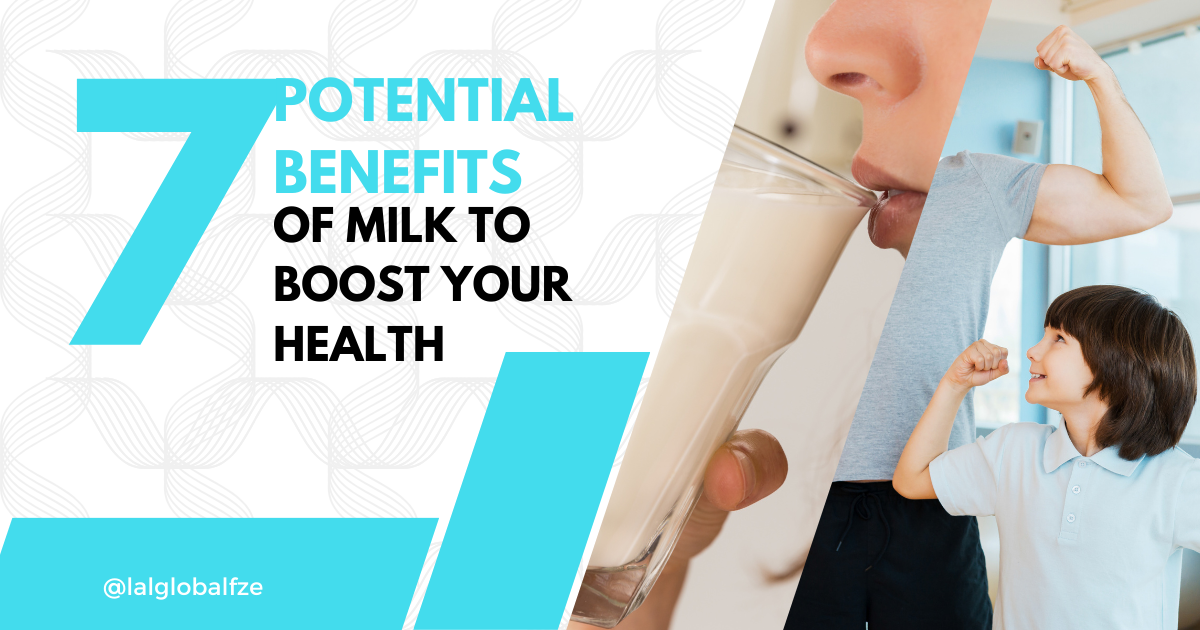Milk has been a dietary staple for centuries, providing essential nutrients for people of all ages. But with so many different drink options available today, it’s important to understand the potential health benefits milk can offer. This article will explore seven ways milk consumption can contribute to your overall well-being.
Nutritional Profile of Milk
Milk is packed with a variety of nutrients that our bodies need to function properly. These include calcium, which is crucial for strong bones and teeth, and high-quality protein for building and repairing muscles. As well as essential vitamins like vitamin D, riboflavin, and vitamin B12. Including milk in a balanced diet helps ensure you’re getting the necessary nutrients for optimal health.
Building Strong Bones
Calcium is the main building block of bones, and vitamin D helps our bodies absorb calcium from food. Milk is a naturally rich source of both these nutrients, making it a great choice for promoting bone health. Studies have shown that consuming milk regularly, particularly during childhood and adolescence, can help increase bone density and reduce the risk of fractures later in life.
Muscle Growth and Repair
Milk has all nine essential amino acids, making it a complete protein source. These amino acids present in milk cannot be produced by the body on its own. They are also the building blocks of muscle tissue, and milk consumption can be especially beneficial for athletes and active individuals who are constantly repairing and rebuilding muscle. Research suggests that including milk in post-workout routines can aid in muscle recovery and improve exercise performance.
Weight Management
Milk can be a helpful tool for weight management due to its satiating properties. The protein and healthy fats in milk help you feel fuller for longer, potentially reducing calorie intake throughout the day. While more research is needed, some studies suggest that milk consumption may be associated with a lower risk of obesity, particularly in children and adolescents.
Keeping Your Heart Healthy
Contrary to popular belief, milk may contribute to heart health. While some milk fats can raise cholesterol levels, milk also contains beneficial nutrients like potassium and magnesium, which can help lower blood pressure and improve overall cardiovascular health. Studies have shown that moderate milk consumption may be linked to a reduced risk of heart disease.
Healthy Smile, Happy You
Milk isn’t just good for your bones; it can also benefit your teeth. Calcium and phosphorus, both abundant in milk, are essential minerals for maintaining strong tooth enamel. Additionally, the vitamin D in milk can help support the immune system, which plays a role in preventing gum disease. Some research suggests that milk consumption may help reduce the risk of cavities.
Stay Hydrated
Milk is a surprisingly good source of hydration, with almost 90% water content. It’s a refreshing and nutritious alternative to sugary drinks and can help you meet your daily fluid needs. Staying hydrated is essential for various bodily functions, including regulating body temperature, flushing toxins, and maintaining healthy digestion.
Glowing from the Inside Out
Milk contains several nutrients that can contribute to healthy skin. Vitamin A, found in milk, helps maintain skin cell turnover and promotes a youthful appearance. Vitamin E, another nutrient in milk, acts as an antioxidant and may protect the skin from sun damage. While more research is needed, some people find that incorporating milk into their diet positively impacts their skin health.
Conclusion
Milk offers a range of potential health benefits, from building strong bones and muscles to supporting heart and dental health. The nutrients in milk can also contribute to hydration and overall well-being. Milk is a great choice if you’re looking for a nutritious and delicious beverage to add to your diet. A moderate diet is the key to a healthy lifestyle. Consulting with a healthcare professional also works best for personalized dietary advice.
FAQ
Q: Is milk good for everyone?
A: While milk is a healthy choice for most people, some individuals may be lactose intolerant or have a milk allergy. If you experience digestive discomfort after consuming milk, it’s best to consult with a doctor or registered dietitian.
Q: What are some alternatives to cow’s milk?
A: There are many dairy-free milk alternatives available, such as almond milk, soy milk, and oat milk. These options can provide similar nutrients to cow’s milk but may not be as high in protein or calcium. Fortified plant-based milks are a good option if you’re looking for a dairy-free alternative.
Q: How much milk should I drink each day?
A: The recommended daily milk intake can vary depending on age and individual needs. It’s generally recommended to include 2-3 servings of dairy products, including milk, yogurt, and cheese, in your daily diet.

